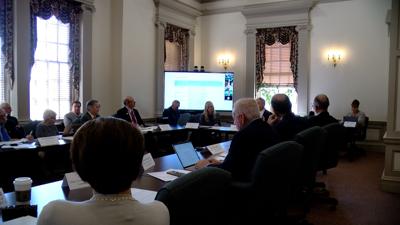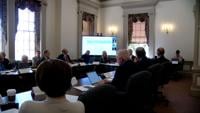DOVER, DE- State leaders, agencies, and energy advocates met Monday in Dover for the first Nuclear Energy Feasibility Task Force hearing, raising a question that could shape Delaware's energy future: Is it time to go nuclear?
The 25-member task force, created under Senate Concurrent Resolution 18, will study whether Small Modular Reactors (SMRs) are viable for Delaware. It will evaluate technical, economic, and environmental factors and consider how they could reduce reliance on imported power and stabilize energy costs.
Officials say Delaware currently imports about 60% of its electricity, and experts warn that dependence on out-of-state power could become a problem as demand rises.
Robert DeNight, vice president of nuclear engineering at PSEG and a task force member, says energy demand in the region is increasing rapidly.
"By 2030, there will be approximately a 40% increase in demand on the PJM grid associated with data centers. Initial estimates are that by 2035, demand is going to outpace supply in the Northeast region."
Rising supply and demand concerns are a key reason the task force held its first meeting, bringing together state leaders, energy advocates, and industry experts to explore ways to stay ahead of increasing energy costs.
DeNight stressed the need to evaluate all options to prevent a future crisis.
"Whether it's a fossil plant like a gas, cogeneration power plant, small modular reactor or a large nuclear plant, it can take anywhere from 5 to 10 years to build. So we're already talking about 2035, when we would expect to have an energy crisis in the northeast area."
He noted that SMRs offer advanced safety features with smaller designs and fewer components.
"It's got an improved design, fewer components, and more safety features built in so that even a worst-case scenario, like a Three Mile Island or even Fukushima, would be limited to the fence line of the small modular reactor site."
DeNight added that the task force will weigh SMRs alongside other options, examining economic impacts and what makes the most sense for the state.
"With that said, small modular reactors are less from a megawatt generation production standpoint. And with that, we've got to look at its economics and see if it will make sense."
Martin Willis, a union boilermaker and member of the task force, says Delaware should consider larger-scale nuclear options for long-term sustainability.
"I'm skeptical about SMRs. You'll still need the same amount of personnel as a large gigawatt facility. You're still going to need a containment building."
Willis added that the time to go nuclear is now to meet growing energy demands and prevent future shortages.
"We currently have in-house 40 600MW power. By 2040, we're going to need that amount of energy. So why not? Small state, small area land, nuclear power. "
He also emphasized the efficiency and cleanliness of nuclear energy.
"Nuclear power has no greenhouse gas emissions. Nuclear power is 94% efficient."
DeNight noted that while federal support for new nuclear builds is strong, sustaining progress through multiple administrations could be difficult.
"Right now, the federal government is very supportive of new nuclear builds to really get the base in this country going again. And that's good. However, any build is going to have to survive multiple administrations."
The task force plans to continue exploring ways to expand and improve Delaware's energy future. The next meeting is scheduled for December 1 at 9 a.m. at Legislative Hall. A final report is due to the General Assembly and the Governor by December 31, 2025.



